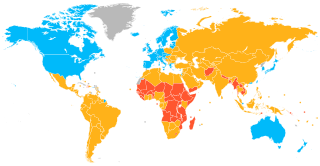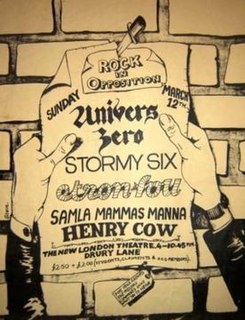The Speech Assessment Methods Phonetic Alphabet (SAMPA) is a computer-readable phonetic script using 7-bit printable ASCII characters, based on the International Phonetic Alphabet (IPA). It was originally developed in the late 1980s for six European languages by the EEC ESPRIT information technology research and development program. As many symbols as possible have been taken over from the IPA; where this is not possible, other signs that are available are used, e.g. [@] for schwa, [2] for the vowel sound found in French deux, and [9] for the vowel sound found in French neuf.

A developed country is a sovereign state that has a high quality of life, developed economy and advanced technological infrastructure relative to other less industrialized nations. Most commonly, the criteria for evaluating the degree of economic development are gross domestic product (GDP), gross national product (GNP), the per capita income, level of industrialization, amount of widespread infrastructure and general standard of living. Which criteria are to be used and which countries can be classified as being developed are subjects of debate. A point of reference of US$20,000 in 2021 USD nominal GDP per capita for the International Monetary Fund (IMF) is a good point of departure, it is a similar level of development to the United States in 1960.

Doppelmayr/Garaventa Group is an international manufacturer of ropeways and people movers for ski areas, urban transport, amusement parks, and material handling systems. As of 2019, the group have produced over 15,000 installations in 96 countries. The Doppelmayr/Garaventa Group was formed in 2002 when Doppelmayr of Wolfurt, Austria merged with Garaventa AG of Switzerland to form the world's largest ropeway manufacturer.

Rock in Opposition or RIO was a movement representing a collective of progressive bands in the late 1970s united in their opposition to the music industry that refused to recognise their music. It was initiated by English avant-rock group Henry Cow in March 1978 when they invited four mainland European groups to come to London and perform in a festival called "Rock in Opposition".

Atlas Copco is a Swedish multinational industrial company that was founded in 1873. It manufactures industrial tools and equipment.
Assa Abloy AB is a Swedish conglomerate whose offerings include products and services related to locks, doors, gates, and entrance automation. Related products and services include controlling access and confirming identities with keys, cards, tags, mobile, and bio-metric identity verification systems.
PlainTalk is the collective name for several speech synthesis (MacinTalk) and speech recognition technologies developed by Apple Inc. In 1990, Apple invested a lot of work and money in speech recognition technology, hiring many researchers in the field. The result was "PlainTalk", released with the AV models in the Macintosh Quadra series from 1993. It was made a standard system component in System 7.1.2, and has since been shipped on all PowerPC and some 68k Macintoshes.
Lernout & Hauspie Speech Products, or L&H, was a Belgium-based speech recognition technology company, founded by Jo Lernout and Pol Hauspie, that went bankrupt in 2001 because of a fraud engineered by the management. The company was based in Ypres, Flanders, in what was later called Flanders Language Valley.
Panda Security is a Spanish cybersecurity software company that specializes in creating products for IT security. Panda Security started with antivirus software, and the company now also provides and develops cybersecurity software. This includes security products and services for both businesses and home users, as well as protection tools for systems, networks, emails, and other private information. Panda Security employs around 450 people.

Dragon NaturallySpeaking is a speech recognition software package developed by Dragon Systems of Newton, Massachusetts, which was acquired in turn by Lernout & Hauspie Speech Products, Nuance Communications, and Microsoft. It runs on Windows personal computers. Version 15, which supports 32-bit and 64-bit editions of Windows 7, 8 and 10, was released in August 2016.

Google Translate is a multilingual neural machine translation service developed by Google to translate text, documents and websites from one language into another. It offers a website interface, a mobile app for Android and iOS, and an API that helps developers build browser extensions and software applications. As of November 2022, Google Translate supports 133 languages at various levels, and as of April 2016, claimed over 500 million total users, with more than 100 billion words translated daily, after the company stated in May 2013 that it served over 200 million people daily.

Gemalto was an international digital security company providing software applications, secure personal devices such as smart cards and tokens, and managed services. It was formed in June 2006 by the merger of two companies, Axalto and Gemplus International. Gemalto N.V.'s revenue in 2018 was €2.969 billion.
The Global Competitiveness Report (GCR) is a yearly report published by the World Economic Forum. Since 2004, the Global Competitiveness Report ranks countries based on the Global Competitiveness Index, developed by Xavier Sala-i-Martin and Elsa V. Artadi. Before that, the macroeconomic ranks were based on Jeffrey Sachs's Growth Development Index and the microeconomic ranks were based on Michael Porter's Business Competitiveness Index. The Global Competitiveness Index integrates the macroeconomic and the micro/business aspects of competitiveness into a single index.

NATO is an international military alliance that consists of 30 member states from Europe and North America. It was established at the signing of the North Atlantic Treaty on 4 April 1949. Article 5 of the treaty states that if an armed attack occurs against one of the member states, it shall be considered an attack against all members, and other members shall assist the attacked member, with armed forces if necessary. Article 6 of the treaty limits the scope of Article 5 to the islands north of the Tropic of Cancer, the North American and European mainlands, the entirety of Turkey, and French Algeria. As such, an attack on Hawaii, Puerto Rico, French Guiana, Ceuta, or Melilla, among other places, would not trigger an Article 5 response.
SVOX is an embedded speech technology company founded in 2000 and headquartered in Zurich, Switzerland. SVOX was acquired by Nuance Communications in 2011. The company's products included Automated Speech Recognition (ASR), Text-to-Speech (TTS) and Speech Dialog systems, with customers mostly being manufacturers and system integrators in automotive and mobile device industries.
A cappella is an adjective that means unaccompanied singing.

WordQ® is an assistive technology software developed by Quillsoft Ltd. and Holland Bloorview Kids Rehabilitation Hospital. WordQ's main purpose is helping individuals who struggle with reading and writing. Often that struggle is due to physical disability or neurodivergence such as Dyslexia or ADHD. WordQ uses intelligent word prediction to suggest words that the user is typing in as few as 1.3 keystrokes. This helps with spelling, and reduces the amount of physical movements a user has to make when typing. It also uses high-quality Acapela text-to-speech voices to read back text that the user has entered, allowing for proofreading and editing. WordQs speech recognition feature, SpeakQ®, is included in WordQ Desktop for Windows OS. It allows users to switch between speaking and typing while writing. WordQ Desktop is available for Windows and Mac OS, iWordQ is available for iPadOS, and WordQ Chrome for the Chrome browser is slated for release in January 2022.

Speech Services is a screen reader application developed by Google for its Android operating system. It powers applications to read aloud (speak) the text on the screen with support for many languages. Text-to-Speech may be used by apps such as Google Play Books for reading books aloud, by Google Translate for reading aloud translations providing useful insight to the pronunciation of words, by Google Talkback and other spoken feedback accessibility-based applications, as well as by third-party apps. Users must install voice data for each language.
Appen Limited is a publicly traded data company listed on the Australian Securities Exchange (ASX) under the code APX.
Hate speech is public speech that expresses hate or encourages violence towards a person or group based on something such as race, religion, sex, or sexual orientation. Hate speech is "usually thought to include communications of animosity or disparagement of an individual or a group on account of a group characteristic such as race, colour, national origin, sex, disability, religion, or sexual orientation".









